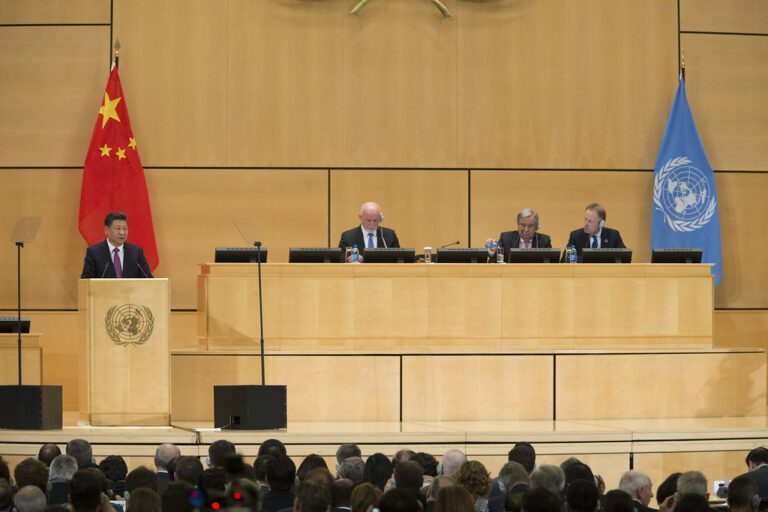China’s Digital Silk Road in the Western Balkans: Threat or Opportunity?

This article is based on a research report titled ‘The Western Balkans and China’s Digital Silk Road: Keen Strategic Cooperation or Cautious Limited Engagement’ originally published on January 16, 2025, by the German Marshall Fund of the United States.
China’s presence in the Western Balkans has varying degrees of impact on human rights, geopolitics, security, democracy, and the region’s aspirations for the EU integration and the US support. While some countries have embraced China’s Digital Silk Road (DSR), others express concerns over the DSR’s implications for their Euro-Atlantic aspirations and national security.
The DSR, a key component of the Belt and Road Initiative (BRI), aims to enhance internet connectivity, digital infrastructure, and technological development in partner countries, which it does through smart city projects, telecommunications networks, and artificial intelligence. There is, however, a significant trade-off: countries participating in the DSR must confront concerns related to geopolitical entanglements, data privacy, national security, and cybersecurity vulnerabilities.
China’s pursuit of technological influence is closely linked to Huawei, a major multinational tech company. The risks lie in Huawei’s potential to provide Beijing with access to 5G networks, thereby raising serious national security concerns. In light of these risks, the six Western Balkan nations have adopted different strategies in their engagement with China.
Serbia: China’s Closest Friend in the Region
Serbia has long positioned itself as one of China’s strongest allies in the Western Balkans. Belgrade has signed multiple agreements with Huawei on projects involving surveillance networks and smart city development. The installation of thousands of facial recognition cameras in the capital under the pretext of public safety promotion has, in particular, sparked concerns about privacy violations and mass surveillance.
The Sino-Serbian cooperation goes beyond telecommunications into areas of digital governance, artificial intelligence, and cybersecurity. Despite repeated warnings from the US and the EU, Belgrade continues to deepen its partnership with Beijing and court investments by Huawei into its digitalization projects. The deployment of Huawei’s facial-recognition and surveillance technologies undermines not only citizens’ rights to privacy but also their broader human rights by interfering with the freedom of expression and movement. The protection of “order and security” is, therefore, just the pretext the authorities use to entrust such a sensitive system to an untrusted vendor like Huawei.
This approach sets a concerning precedent for the broader region. By prioritizing short-term economic gains over long-term sovereignty, Serbia risks not just increased dependency on China but also greater geopolitical instability.
Cautious Cooperation
In contrast to Serbia, Albania, Kosovo, and North Macedonia have adopted a more cautious approach to China’s DSR. All three are members of the US-led Clean Network Initiative, which seeks to exclude untrusted vendors from their 5G infrastructures.
Albania seeks to balance economic cooperation with strategic caution. As a NATO member that hopes to become a member of the EU, Albania takes a measured approach to international partnerships. While it was once oriented toward China, recent years have seen a reorientation toward the West. North Macedonia has shifted away from Huawei after 2017, signaling its commitment to the West and the prioritization of national security and allies over short-term economic benefits. However, questions remain about the current government and how future political developments might influence the country’s position on the geopolitical spectrum. Until now, North Macedonia has made it clear that it aligns with the Western powers, but this may not be guaranteed going forward.
Meanwhile, Kosovo has proven the most resilient to Chinese influence. It has no cooperation with China’s DSR and holds a strong strategic alignment with the West. Kosovo has opted for Western-approved infrastructure projects to safeguard its digital networks and avoid endangering its national security. Companies like Nokia and Ericsson have been chosen to develop its telecommunications networks. Indeed, within the Western Balkan region, Kosovo stands out for its firm opposition to Chinese influence and emphasis on strong alignment with NATO, the EU and the US. Recognizing China’s close relationship with Serbia, Kosovo remains vigilant and cautious of Beijing’s intentions. Its resistance to Chinese influence extends beyond digital infrastructure, reflecting a broader strategic effort to block China’s presence within its borders.
Between Economic Debt and Digital Sovereignty
Montenegro finds itself in a complicated situation due to a controversial Chinese loan for the Bar-Boljare highway construction project that has left the country heavily indebted. Montenegro’s experience with China has thus been marked by economic challenges. The politically contentious Chinese loan for the highway scheme burdened Montenegro with an enormous debt, sparking concerns about a debt-trap scenario. Though Montenegro has not completely avoided Chinese technology investments, it has been cautious in its approach to Huawei, recognizing the risks of over-reliance on Beijing.
Recent efforts to expand and diversify its technological partnerships indicate a trend toward closer alignment with the EU’s cybersecurity standards. Based on its experience with the highway construction project, Montenegro would be wise to resist future Chinese involvement in its digital infrastructure projects.
A Divided Approach
Bosnia and Herzegovina presents a unique case, as its engagement with China is heavily influenced by its complex political structure. While the Federation of Bosnia and Herzegovina aligns closely with the EU, Republika Srpska has fostered deeper ties with Beijing, particularly in the digital realm. Huawei’s strong presence in Republika Srpska has expanded Chinese influence, despite Western concerns over cybersecurity vulnerabilities.
Republika Srpska’s closeness to China is in line with its broader geopolitical strategy of distancing itself from Western oversight. It has actively encouraged Chinese investment, including in digital infrastructure and AI-based security systems. Recent changes to the country’s constitution and electoral code reforms have complicated the government formation, thus undermining the country’s stability. Provocations from Republika Srpska continue and its 2023 decision to withdraw from the country’s Constitutional Court, which was a unilateral move without legal basis, has added fuel to the ongoing tensions within the country.
Meanwhile, the Federation of Bosnia and Herzegovina remains cautious, seeking to align closely with the EU’s cybersecurity policies. This internal division complicates Bosnia and Herzegovina’s digital strategy, as it struggles to maintain a unified approach while balancing competing interests.
Balancing Digital Development with Security
The future of the Western Balkans depends on the region’s ability to build robust digital infrastructure and maintain strategic independence. As the demand for secure digital networks grows, it becomes increasingly vital to align technological development with national sovereignty.
The Western Balkan countries should be mindful in choosing their partners to ensure that their long-term political and security goals are not compromised. This includes strengthening legal frameworks, enhancing cybersecurity resilience, working with trusted vendors, and investing in digital literacy. By following these steps, they can create a secure digital landscape that ensures geopolitical stability.
Ultimately, the region’s digital future depends on a delicate balancing act. The key question remains: will the appeal of Chinese digital investments outweigh the region’s Euro-Atlantic aspirations, or will the Western Balkans successfully navigate this geopolitical crossroads? The answer is simple: Western Balkan countries must prioritize security over technological dependency.
Written by
Arta Haxhixhemaji
Arta Haxhixhemajli is the Research Officer at The Balkan Forum. She holds a bachelor's degree in International Relations from the University of Warsaw and a master's degree in World Politics and International Relations from the University of Pavia. Previously, Arta was a Non-Resident Researcher at the German Marshall of the United States. Her research interests include geopolitics, warfare studies, the security dilemma, national security, and cybersecurity. In addition to her native Albanian, she is fluent in English and French.


